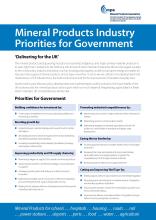The UK-based
MPA Chief Executive Nigel Jackson said “With a number of major and overdue decisions pending on high profile transport and energy projects, such as Hinkley Point, the 3rd runway in the SE and the Swansea Tidal Lagoon, and increasing concerns about the pace of delivery of planned infrastructure, this is no time to lose determination or focus. Key strategic initiatives such as the Northern Powerhouse must remain high on the Government’s agenda.
“We will be working with partners and stakeholders to make sure that the Government is made aware of the key priorities for our industry going forward and ensure that there is a rational and objective review of future regulation. We are not convinced that any objective evaluation of EU ‘red tape’ has been undertaken and [there has been] certainly no informed assessment of 43 years of transposition of EU regulation into UK law. We believe that it will not be easy, quick or even desirable to try and unpack the current corpus of regulation without knowing what will supersede it. It is often UK interpretation and implementation that is more of a problem than EU regulation and the distinction needs to be clear.
“The vital role technical product standards and design codes play should not be overlooked and illustrates how the UK will need to stay involved in European organisations regardless of the eventual shape of our new relationship.
“We would also urge the Government and the EU to think creatively and innovatively to enable the UK to balance access to the single market with proportionate and sufficient free movement of labour to help fill our skills gap.”





